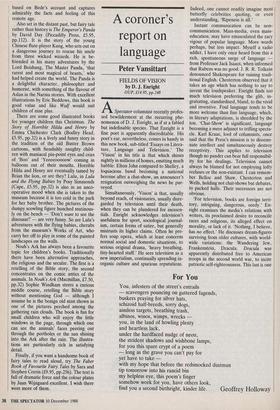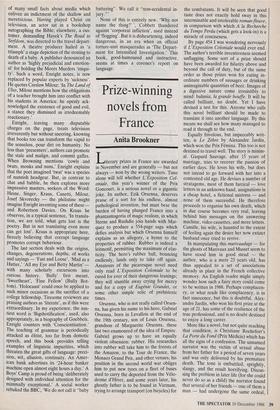A coroner's report on language
Peter Vansittart
FIELDS OF VISION by D. J. Enright OUP, £14.95, pp.248 ASpectator columnist recently profes- sed bewilderment at the recurring phe- nomenon of D. J. Enright, as if at a fabled but indefinable species. That Enright is a fine poet is apparently discreditable. His poet's ear, nevertheless, comes in handy in this new book, sub-titled 'Essays on Litera- ture, Language and Television.' The 'Vision' in his title is that which shines nightly in millions of homes, emitting much babble: Elton John compared to Shelley, a loquacious bawd becoming a national heroine after a chat-show, an announcer's resignation outweighing the news he pur- veyed.
Simultaneously, 'Vision' is that, usually beyond reach, of visionaries, usually disre- garded by television until their death, when they can be plundered for inessen- tials. Enright acknowledges television's usefulness for sport, sociological journal- ism, certain forms of satire, but generally mistrusts its higher claims. Often he pre- fers soap opera, which at least concerns normal social and domestic situations, to serious original drama, 'heavy breathing, tiny-hearted stuff.' He sees television as a new imperialism, continually spreading in- organic culture and spurious reputations. Indeed, one cannot readily imagine most butterfly celebrities quoting, or even understanding, 'Ripeness is all.'
Instant communication can be non- communication. Mass-media, even mass- education, may have emasculated the racy vigour of popular language. More words perhaps, but less impact. Myself a radio addict, I have only once heard from this a rich, spontaneous surge of language — from Professor Jack Isaacs, when informed that Rubens was no good. J. R. R. Tolkein denounced Shakespeare for ruining tradi- tional English. Chesterton observed that it takes an age which has nothing to say to invent the loudspeaker. Enright finds too much television preferring the glib, in- gratiating, standardised, bland, to the vivid and inventive. Foul language tends to be more welcome than fine language, which, in literary adaptations, is shredded by the ton. `Chat-Show' is significant, language becoming a mere adjunct to trifling specta- cle. Karl Kraus, lord of columnists, once said that the Press's mission is to dissemi- nate intellect and simultaneously destroy receptivity. This applies to television though no pander can bear full responsibil- ity for his dealings. Television cannot always be blamed for not employing lofty recluses or the non-existant. I can remem- ber Belloc and Shaw, Chesterton and Wells, holding not chat-shows but debates, to packed halls. Their successors are not obvious.
'For television, books are foreign terri- tory, intriguing, dangerous, seedy.' En- right examines the media's relations with writers, its proclaimed desire to reconcile races and religions, its alleged effect on morality, or lack of it. 'Nothing, I believe, has no effect.' He discusses dream-figures surviving from older cultures, with world- wide variations: the Wandering Jew, Frankenstein, Dracula. Dracula was apparently distributed free to American troops in the second world war, to incite patriotic self-righteousness. This last is one of many small facts about media which enliven an indictment of the shallow and meretricious. Having played Christ on television, an actor sat in a bookshop autographing the Bible; elsewhere, a cus- tomer, demanding Hayek's The Road to Serfdom, was directed to the travel depart- ment. A theatre producer hailed as 'a triumph' a stage depiction of the stoning to death of a baby. A publisher denounced an author as 'highly prejudicial and emotion- al' for holding the Moors Murders 'iniqui- ty'. Such a word, Enright notes, is now replaced by popular experts by 'sickness'. He quotes Czeslaw Milosz: 'In The Land of Ulso, Milosz mentions how the obligations of a teacher brought him into conflict with his students in America: he openly ack- nowledged the existence of good and evil, a stance they dismissed as irredeemably reactionary.'
Enright, leaving many disputable charges on the page, treats television irreverently but without sneering, knowing that books too can transform the vapid to the senseless, pour dirt on humanity. No less than 'presenters', authors can promote the stale and malign, and commit gaffes. When Browning mentions 'cowls and twats, monks and nuns,' Enright explains that the poet imagined 'twat' was a species of nunnish headgear. But, in contrast to chat and babble, he then explores more Impressive masters, seekers of the Word: Heine, Singer, Kraus, Canetti, Milosz, Josef Skvorecky — the philistine might imagine Enright inventing some of these — and Robertson Davies. On Kraus he observes, in a typical sentence, 'In transla- tion, we are told, what gets lost is the poetry. But in not translating even more can get lost'. Kraus is appropriate here, fiercely believing that corrupt language promotes corrupt behaviour.
The last section deals with the origins, changes, degenerations, depths, of works and sayings — 'Fast and Loose', 'Mad as a Hatter,' All my Eye and Betty Martin' — with many scholarly excursions into curious history. 'Bully' first meant, 'Sweetheart', 'Fine Fellow' (Bully Bot- tom). 'Holocaust' could once be applied to such minor occasions as the sacrifice of a college fellowship. Tiresome reviewers are praising authors as 'literate', as if this were extraordinary. In my experience, the nas- tiest word is 'Bigshotification', used, also appropriately, in a biography of Goebbels. Enright counters with 'Conscientisation.' The teaching of grammar is periodically attacked as elitist, too far from demotic speech, and this book provides telling examples of linguistic impurities, which threaten the great gifts of language: preci- sion, wit, allusion, continuity. An Amer- ican bank advertises its '24-hour banker machine open almost eight hours a day.' A Boys' Camp is proud of being 'deliberately designed with individual attention for the minimally exceptional.' A social worker rebuked the BBC, 'We do not call it "baby battering". We call it "non-accidental in- jury."' None of this is entirely new. 'Why not name the thing?", Cobbett thundered against 'corporeal infliction', used instead of 'flogging'. But it is disheartening, indeed dangerous, in an era when an official torture-unit masquerades as 'The Depart- ment for Intensified Investigation.' This book, good-humoured and instructive, seems at times a coroner's report on language.



























































 Previous page
Previous page